Advantages and Disadvantages of FamilyIntroductionSocially an individual, whether a male or female, is considered a single entity that belongs to a group of people (male and female) known as parents who give birth and raise them in a house. When these individual stays together in a house and have a relationship makes a family. A family is a group of people who have blood relations, are married, and live together after adoption under one roof. 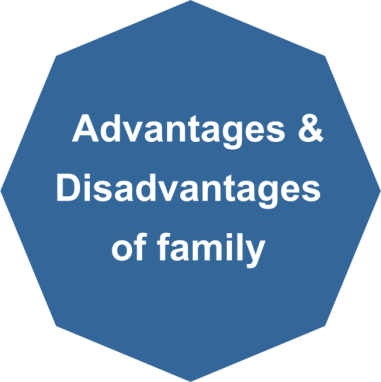
Family is considered as the smallest and most basic unit of society. It is the primary social group that shares social and economic responsibilities. Family gives a social environment to the child born and brought up there that is responsible for developing its attitude (where two parents raise their child). "Family can be stated as the legalization of the sexual relationship between a male or female in the name of marriage in which both fulfil their responsibilities and play their roles efficiently. The couple is responsible for taking family to next generation by giving birth to a child and brought it up." "A family is defined when people stays together under one roof due to blood relation or adopted and share food, income, love, care, affection, responsibilities, etc." 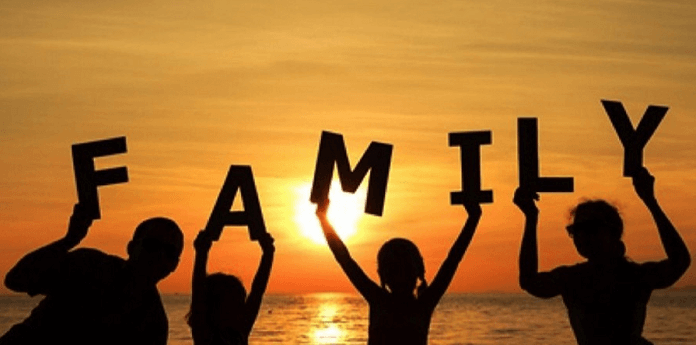
There are different criteria on which families are distinguished, i.e., the type of family is based on various stages of human life. Family can be structured like this, as shown in the image: As shown above, these types of families 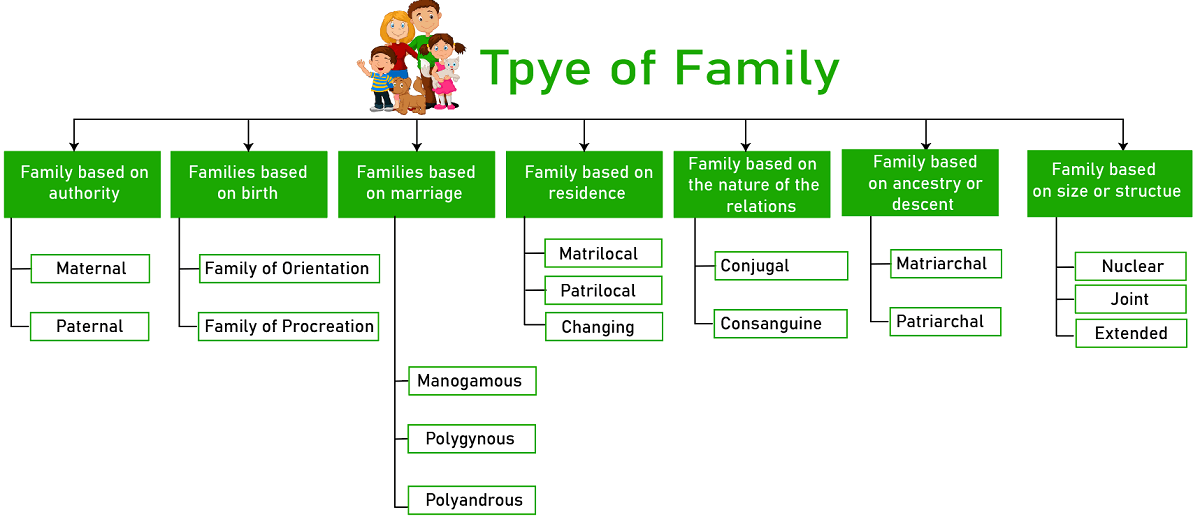
a) Families based on birth
b) Families based on marriage
c) Family-based on residence
d) Family-based on the nature of the relation
e) Family-based on ancestry or descent
f) Family-based on authority
g) Family-based on size or structure
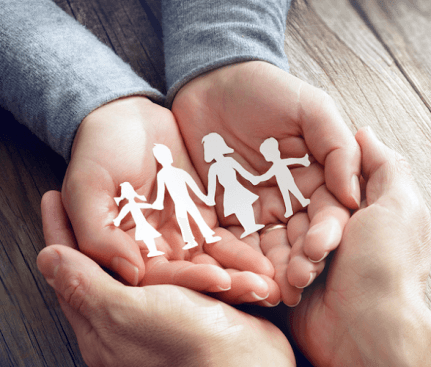
Characteristics of a Family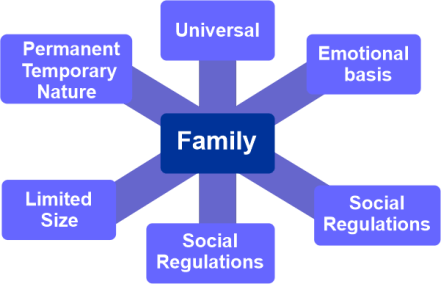
Here are some of the characteristics of family as follows:
Functions of family
Family plays a vital role and affects each area, decision, and aspect of your life. Everyone has a different definition of the family because it means something different to everyone. It's true that socially we are acknowledged by family, directly or indirectly we depend on the family in many criteria. On this basis, the family has various advantages and disadvantages. Let's learn some of them: Advantages of family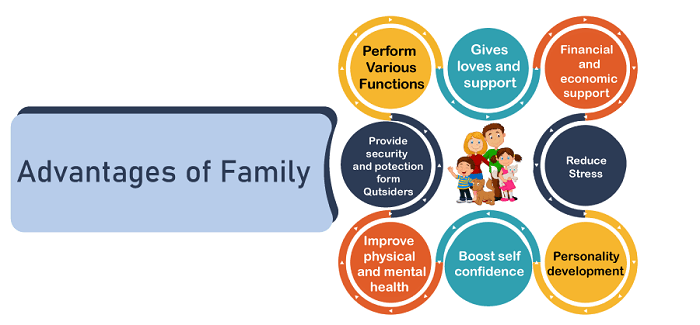
a) Perform various functionsThe culture of the family started before humans came into existence. The animals reproduce by mating and reproducing a new generation. Animals do have a family like humans. Every family plays their role by performing these functions:
b) Gives love and supportEveryone needs love in life, and family is the only one who gives you unconditional love despite all your positives and negatives. No one support you as your family can as they brought you up, give you their name, fame, wealth, etc., and fully support you in finding your own identity. Family provides a framework for future relationships that help you form secure attachments. Family is the greatest source of love, care, support, encouragement, security, and many more. Children in a joint family get more love and affection than other families. c) Financial and economic supportFamily provides economic security by fulfilling the family's financial needs, including the health and well-being of children and their parents in the long and short term. Family having good financial condition provide all the luxuries to their child, including the best education, food, and clothing, fulfilling their desires. All parents give their everything to support their children even beyond their limits. d) Provide security and protection from outsidersFamily act as a protection wall for every individual, especially joint families, and has proved to be an excellent resource for care where members feel safe and secure (protected from verbal, emotional, physical, or sexual abuse). On a priority base, family ensures you protect at each level. Here develop a sense of security where individuals feel comfortable when they encounter and interact with other people. e) Reduce stressFamily is one stress buster medicine that listens to your problems and issues and tries to calm you. Rather, they sometimes can't solve the problem but distract you from it and support you in fighting a situation at any cost. The study has concluded that people who spend time with their family and friends as a stress buffer instead of drinking alcohol, smoking, or doing drugs are most happy and healthy. Communicating with family helps reduce stress in major cases. f) Improve physical & mental healthFamily's unconditional love and support help us get through the most disastrous and best times. Family always works in a direction to bring out the best in you, even if you can't see it yourself. In the family, a mother generally takes care of her child's food, well-being, and physical health, working as she is more attached to a child and the father focuses on fulfilling. A family is where you let yourself free and a source of comfort, guidance, and strength that reduce stress and improve physical and mental health. g) Boots self-confidenceFamily is responsible for building an individual's self-confidence or self-esteem, which happens when they pay attention, show they are proud of their child, and let the child try whatever she wants. The family focuses on a child's positive or strengths and tries to help them in all ways to develop a positive attitude toward everything that happens in life that boosts an individual's self-confidence. In some cases, it is said that when the world doesn't believe you, only your family believes in your ability to succeed in situations. h) Personality developmentPersonality helps each person to establish his identity or define someone. Personality can't be formed in one day. It is an ongoing development process that improves with the proper guidance of parents and teachers. A personality is made of human behavior, thoughts, characteristics, and feelings that initially develop during childhood within the family. What child learns from or in their family adapt that in their personality. Some personality traits like height, complexion, features, healthy physique, etc., received hereditary. Personality development is a part of human development that is affected by family as it is nature's masterpiece. It is responsible for creating a positive and negative impact on the child, which sometimes decides its future. Disadvantages of FamilyRather family is a beautiful and safe gift where you can survive, but everyone has different parameters. Every good thing has some bad measures too, so let's learn some of the disadvantages of having a family: 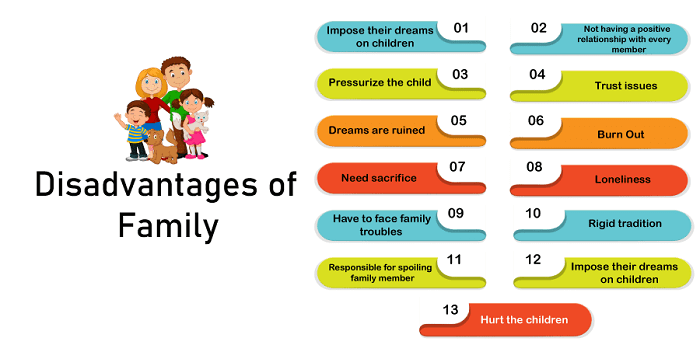
a) Impose their dreams on childrenIn most cases, parents or family members see an extension of themselves in their children rather than a separate person with their hopes and aspiration. They were brought up with a dream that their children achieve what they couldn't. Whether child accepts this or not, they impose their dreams on them. The study has confirmed that parents impose their unfulfilled achievements on their kids to be fulfilled. b) Pressurize the childParents constantly keep pressure on their children in the name of studies, learning, and remaining in competition with other children. They put their child in an unwanted race from birth and push them to excel in every field. A study in 2021 stated that 86% of parents pressured their kids to pay more attention to their kids because they grew up with a distant or negligent parent. c) Hurt the childrenNo parent can dream of harming or hurting their child, but to stop their child from being harmed in the future, they hurt them physically, emotionally, and psychologically. To secure children and keep them secure, parents hit their children physically, torched them emotionally (by taunting, blaming, and accusing the child in front of peers and relatives), and other kinds of physical abuse. Whatever the situation, it is not ok to harm the child it affect them mentally and emotionally. The highs and lows of the family affect the child mentally and emotionally. For example, disputes between family members, fight between parents daily, and hurdles created by some members who are jealous of you can negatively impact the child (mentally and emotionally). Fight between parents can affect the child most, it is declared by doctors worldwide. A once physical wound can be cured, but mental and emotional wounds remain though out a life that sometimes makes a child emotionally and mentally weak. d) Dreams are ruinedEvery child is different; therefore, its dreams are also different, but some parents' scenarios and thinking toward their child's dreams are the same. Some parents truly support their child's dreams, but those who don't agree have various reasons, such as:
e) Need sacrificeMaking and surviving a family need various sacrifices from each family member. These sacrifices start from the two individual males or females who sacrifice their time, emotions, money, relationships, freedom, personal life, career, social life, food, desires, etc., to be in a relationship and transform into 'mom' & 'dad'. Parents dedicate their life to bringing up their children and making a successful, happy and lovely family. f) Have to face home troublesNo family can be perfect beyond love, affection, and care, there are various ups and down, a family has to face to make their survival. For example:
g) Responsible for spoiling family memberSpoiling a child is a common disadvantage of a family seen in every second family. Some families are responsible for spoiling their children even parents spoil themselves. Parents being too busy earning for having a lavish life, give everything to their child except time and love may spoil their child. A permissive parenting style is the main cause of spoiling a child in which parents don't set any boundaries or limits for the child. Being so lenient gives too much power to the child, which leads them to the wrong path in perusing life. A child doesn't respect anyone, becomes annoying and arrogant, can't handle emotions, cannot understand others' pain, etc. h) Less Personnel space or limited space.This problem is common in Indian families where sometimes no space is provided to the child or couples. Everyone needs personal space to help us stay safe in this modern world. Parents and family members interfere and try to control each part of their children, which sometimes becomes the root cause of aggression, hate, and fighting. Parents being insecure thought that space may lose control over the child and result in violation of relations. This problem mostly arises in joint families where everyone has to stay under one roof by caring for others' emotions and feelings, sometimes choking for someone. i) Not having a positive relationship with every member.As we have discussed above, every family has to deal with many issues, and the relationship between family members is one of them. If a family member always heads toward fighting, having disputes over money, land, etc., can lead to destruction. Not every family member needs to share a healthy relationship. Sometimes cousins share a loving bond, but siblings do not, which results in fighting and jealousy. Joint families have this kind of problem mainly where brothers, sisters, parents, and grandparents all have their reason for fighting. j) Trust issuesA family has a different mindset, people living under one roof, and being a family, they don't need to have deep trust in each other, especially in this modern era where no one trusts each other and how families can be left untouched. Sometimes siblings don't trust each other, and family members have various trust issues that result in disputes and fights. k) BurnoutBurnout is one of the major disadvantages of family, which can be seen in most families. Burnout is when a person feels depressed, shows addictive behavior, has lowered mood, has sleep disruption, or has a conflict with a partner. In this situation, a person feels emotionally and physically exhausted due to family. Parents who don't have emotional support, single parent, and some having high expectations of themselves are at higher of burnout. Symptoms of burnout:
l) LonelinessWe humans need someone to listen to and support us and handle our ups and down. The orphan or one who loses his family accidentally knows the value of family because if you have a family, you are the richest person in the world, as you have someone to stand beside and behind you unconditionally. A person without family can be the victim of loneliness, leading to depression, anxiety, and other psychological problems. m) Rigid traditionsMany cases have proved that some rigid traditions are responsible for destroying the family. Some orthodox families stuck to rigid traditions and bound their children to them. They force their child to follow that tradition and don't cross boundaries. They kept children under strict discipline, crushed their dreams, and suppressed them at every stage of life, which became the reason for many problems in the families. Conclusion:We have discussed some of the advantages and disadvantages of the family from which it is concluded that every individual needs a basic unit of society called the family to take birth, raise and live a life. An individual's life takes a breath on the pillars of strength, encouragement, inspiration, and love a person receives from family. Advantages and disadvantages depict the family as necessary in developing the child's personality, the way he sees himself, interpersonal; relations, and his view about the world, other people, society, etc. The two individuals, male or female, bound themselves in a relationship and produce children in an environment where they live independently, get the courage to face the world, survive and let themselves establish themselves in society. As no one is perfect same as with families, and no family is perfect, but with all the difficulties, people in a family life with love, care, and empathy. It's true family is a family, after all. |
 For Videos Join Our Youtube Channel: Join Now
For Videos Join Our Youtube Channel: Join Now
Feedback
- Send your Feedback to [email protected]
Help Others, Please Share










